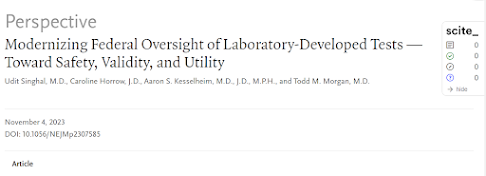##
Update, I saw this "ahead of print," the citation is here: November 9, 2023, N Engl J Med 2023; 389:1735-1737.
###
NEJM Op Ed in Brief
The article discusses the need to modernize federal oversight of laboratory-developed tests (LDTs), which are diagnostic tests created and used within a single laboratory. LDTs have become more complex and widespread, with some being used globally. However, federal regulation, particularly by the FDA, has not kept up with this growth. Current oversight by the Centers for Medicare and Medicaid Services (CMS) focuses on analytic validity but not clinical validity or utility, leading to potential safety and reliability issues.
The FDA proposed a rule in 2023 to classify LDTs as medical devices, subjecting them to FDA review, but it faces challenges. The article emphasizes the need for a unified regulatory framework to ensure the safety, validity, and utility of LDTs.
__
NEJM Op Ed in Bullets
- Introduction
- Laboratory-developed tests (LDTs) have evolved and become complex.
- Lack of modern federal oversight.
- Federal regulation hasn't kept up with the growth of LDTs.
- FDA's enforcement discretion for LDTs.
- Current Oversight
- CMS oversees LDTs under CLIA, focusing on analytic validity.
- Inadequate reliability of test results.
- Examples of misdiagnoses and false positives due to LDTs.
- Limited transparency in marketing.
- Efforts for Enhanced Regulation
- Congress and FDA have tried unsuccessfully to enhance LDT regulation.
- The VALID Act aimed to establish a risk-based regulatory framework.
- Opposition from hospitals and academic medical centers.
- FDA's Proposed Rule
- In September 2023, the FDA proposed classifying LDTs as medical devices.
- This would phase out FDA's enforcement-discretion policy.
- LDTs would be subject to FDA review, labeling, and reporting requirements.
- Challenges and Future Considerations
- The proposed rule faces a lengthy rulemaking process and legal challenges.
- More legislation may be needed to strengthen CMS standards and FDA authority.
- Need for data disclosure by companies producing LDTs.
- Creation of public repositories for test performance information.
- Importance of postmarketing review and surveillance.
- Balancing regulatory protections with the burden on testing laboratories.
- Conclusion
- The need for modernized federal oversight of LDTs.
- Emphasis on safety, validity, and utility.
- Belief in the importance of a unified regulatory framework.
- Acknowledgment of potential challenges and the need for funding and partnerships.
- Closing remark FDA is an important step but legislation may be preferable
___
(AI assisted summary)
(In the jpeg at top, my browser shows a help screen from SCITE, a subscription, AI-powered article analyzer I use sometimes.
